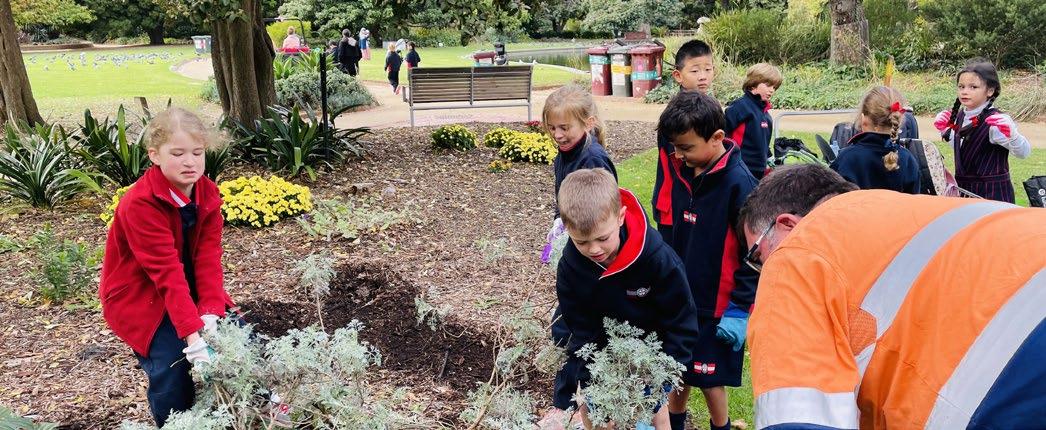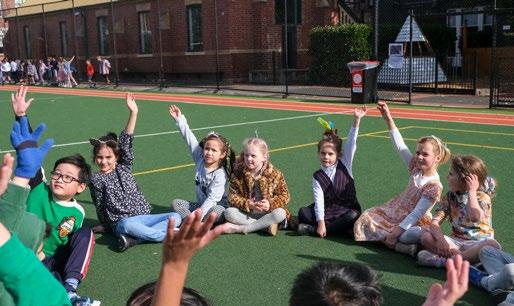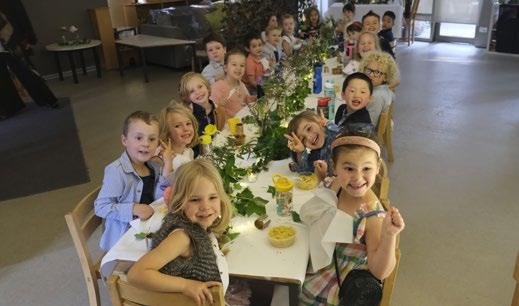
5 minute read
Junior School: reflecting on 2021
Conventional classroom-based teaching and learning was tested again throughout 2021. The unique challenges faced by schools, children, and families continued, where we rapidly adjusted to modes of learning that went from the physical to the virtual and back again. Almost a year and a half later, we appreciate our work, social and school lives have been forever changed, yet so much has been achieved despite the ongoing challenges, and it is important to focus on the many positives that have emerged. In 2021, there has been a requirement for us to be creative and agile as we supported our children to learn in different ways. While learning from their teachers, families were also involved in the lessons. Teachers became experts in all modes of communication, parents developed a deeper understanding of the curriculum, and students became more independent and autonomous learners. For all learners, the capacity to be curious, resilient, persistent, self-regulating, motivated, empathetic, and tenacious has become as important as being able to navigate an iPad or an MS Teams meeting or conducting a Google search. The pandemic has highlighted what educators have long known, and that is the holistic development of a person, their habits of minds and dispositions are formed alongside and through the acquisition of knowledge and skills. These dispositions are critical, as we prepare our children for a very different and ever changing world. Being a lead school in Respectful Relationships and having an embedded program in Positive Psychology, our children were well equipped throughout the year to tap into their strengths, as they demonstrated their capacity to be resilient and tenacious over a sustained period. Children had to manage hardship, disappointment, online fatigue, and frustration, and emerged with a sense of accomplishment having overcome their challenges. Our Navigator Program across the school allowed staff to connect with families, and class teachers were able to assess a child’s engagement, personal wellbeing, challenges, and triumphs. A survey of our Junior School children, conducted by Mr Tim Roberts, Head of Positive Learning, reported high levels of feeling supported and nurtured. Additionally, they felt they were respected and that they were achieving their learning goals throughout the online learning period. After meeting with some of members of the Student Representative Council (SRC), it was clear that the extended periods of online learning could be reviewed to allow for more learning time off a screen. In response, we implemented asynchronous learning time, so children could learn, at their own pace, and only engage online with the teacher if required. Parents and students reported that this shift facilitated increased engagement, ownership and independence, and alleviated some screen fatigue. Always learning, our staff listen and respond to the needs of our students. In 2021, our staff in the Junior School each nominated to be a part of a Professional Learning Team. Each team engaged in practitioner research to enrich our student experience and learning programs. In Literacy, we undertook an audit of our reading and spelling programs. Consequently, we will be refining our approaches, initially in our lower primary years, and introducing basic Literacy concepts in Margaret Thomas House to complement existing programs. In Numeracy, we have analysed standardised data of children Prep-6 and conducted more research into mathematical mindsets. Based on this research, we will be engaging Educational Consultant, Rob Vingerhoets, to work with our staff and build on our existing programs. Our ‘Inquiry’ Professional Learning Team is exploring our pedagogical approaches, student agency and community connections. We have engaged Kath Murdoch, a prominent writer, consultant and university lecturer who has worked extensively, throughout Australia and overseas, in inquirybased learning. Staff probed further into our Learner Profile, researching student agency and those critical dispositions



mentioned previously. Furthermore, our collaborative research with The University of Melbourne’s ‘New Metrics For Success’ project complements our in-school research, where we are examining, generating and trialling new assessment tools. Finally, the Assessment and Reporting Team has piloted our online, continuous reporting program. This pilot was undertaken in Years 2, 4, 5 and 6. In 2022, all students will receive continuous, meaningful feedback in real time at certain points over the term, and all reports will be published online. Research has shown that timely and targeted feedback improves student learning and supports informed learning goals, which in turn improves overall learning outcomes. Our Year 4 children engaged in the award winning, ‘Tomorrow’s Leaders for Sustainability Program.’ The program guides students through a sustainability project and leadership activities in their local environment. We will continue to evolve our environmental science, humanities and citizenship programs in the middle primary years, with local organisations and the Eco Centre at St Kilda Botanical Gardens. Through The Wade Institute, at The University of Melbourne, we also had key staff attend the UpSchool Teacher Workshops, to research entrepreneurship programs for our upper primary students. This work is in its infancy, but we are excited about its potential to inform real-world learning for our students in upper primary. In Semester Two, Mrs Belinda Klose joined the leadership team, as Director (P-3), and she has already made a significant contribution to our early primary years’ programs. Ms Emma Phillips continued in her role as Director (4-6), leading the critical work with the online reporting pilot program. Mr Daniel Zito has been appointed as Director of Curriculum (K-6), commencing 2022, and his work will focus on taking carriage of the Teaching, Learning and Caring Programs. This is a new and pivotal leadership role in the Junior School, focused on ensuring we continue to evolve our high-quality programs. We have streamlined the staffing model in MTH, and our Holiday Program has expanded significantly. Mrs Jill Garcia, Director of OHSC Programs, delivers high quality, engaging and fun programs and I thank her for her tireless work during a challenging year. All staff members across K-6 have managed the demands of this year with grace and an unwavering commitment to our children. Their teacher leadership, support and tireless work allows us to evolve and strive for continuous improvement. Finally, I wish to thank the Parent Community Association. They dedicated their time and provided valuable feedback during a tough year. It has been a great pleasure to witness their commitment. Our aim is to create a climate of curiosity and achievement, a culture of respect and to nurture our children to be caring, thoughtful and ethical lifelong learners. I thank the community for allowing me to serve you and I look forward to a fulfilling 2022.
Nicole Armatas
Head of Junior School
1. Year 5 students showed off their impressive hand painting skills. 2. Year 1 students at the St Kilda Botanical Gardens. 3. Students gathered for the mid-year House Picnic. 4. Margaret Thomas House Kindergarten students dressed up for their annual Children's Dinner Party.

